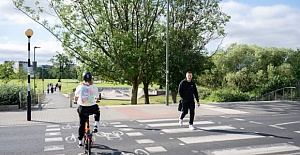The research put to the test a statement by Cities Minister Greg Clark in January 2015 that such was the revival of northern cities to date that the “picture of the north-south divide pulling apart was certainly true in the previous decade… in this decade it is changing. North and south are now pulling in the same direction, which is upwards.”
It also follows Theresa May’s reference to “life being much harder” for “an ordinary working class family” than “many people in Westminster realise”.
The analysis suggests that the economic divergence between London and the Northern regions in England continues to grow, in terms of GVA per head (a measure of the increase in the value of the economy due to the production of goods and services), employment and unemployment. Additionally, the gaps are also growing between London and the North in relation to a number of social outcomes, such as education and health, with improvement in these outcomes in London being in line with economic conditions in the capital bouncing back to pre-recession levels or beyond while the North lags behind.
But economic growth in London has not resulted in reduced poverty or inequality. On the contrary, poverty rates for various groups, including children, have seen much less improvement in London compared to the Northern regions; house price affordability and private rental costs have increased substantially in London but not in the North; homelessness has worsened in London but improved in the North; and overcrowding remains particularly acute in the capital.
The impact of public service cuts made to address austerity have been felt both in London and the North. While it is too soon to tell whether these cuts have direct impact on the provision of services in these regions, the research found evidence that measures related to A&E admissions and waiting times for treatment are deteriorating at a faster rate in London than in the North of England, while pupil-to-teacher ratios in the North are not improving as well as in London. This is putting increased pressures on services in these areas.
The paper, _Pulling in the Same Direction? Economic and Social Outcomes in London and the North of England Since the Recession_, by Polina Obolenskaya, Ruth Lupton and Bert Provan, concludes: “The findings suggest not only a need for regional rebalancing of both the economic and social kind, but that economic growth per se cannot be relied upon to improve social outcomes in any region – and in particular it cannot be relied upon to reduce poverty and inequality”.
It recommends closer monitoring of regional disparities and levels of inequality within regions, and a clearer understandings of how growth strategies and public service reform can generate “inclusive growth” in different local places.


 After Nesil Caliskan a by-election will be held in Jubilee ward in Enfield
After Nesil Caliskan a by-election will be held in Jubilee ward in Enfield Publishing the analysis, Labour’s Cllr Ergin Erbil said Everybody in Enfield deserves basic rights
Publishing the analysis, Labour’s Cllr Ergin Erbil said Everybody in Enfield deserves basic rights Gaza-Israel conflict Statement from Cllr Ergin Erbil, Leader of Enfield Council
Gaza-Israel conflict Statement from Cllr Ergin Erbil, Leader of Enfield Council Cllr Ergin Erbil was elected as the new Leader of Enfield Council
Cllr Ergin Erbil was elected as the new Leader of Enfield Council The International Turkic World Journalists Media Forum will be held in Almaty
The International Turkic World Journalists Media Forum will be held in Almaty GastroANTEP, A FESTIVAL OF ABUNDANCE, FRATERNITY, LOVE, AND AFFECTION
GastroANTEP, A FESTIVAL OF ABUNDANCE, FRATERNITY, LOVE, AND AFFECTION Scientists from the al-Farabi KazNU have developed an online course for a mobile application
Scientists from the al-Farabi KazNU have developed an online course for a mobile application Murder probe launched after 4 killed in UK house fire
Murder probe launched after 4 killed in UK house fire Fenerbahce vs Manchester United Predicted line-ups! Jose Mourinho faces former side
Fenerbahce vs Manchester United Predicted line-ups! Jose Mourinho faces former side London’s Cycleway network expands to cover more than 400km
London’s Cycleway network expands to cover more than 400km Unity EURO Cup champions inclusion and diversity through football
Unity EURO Cup champions inclusion and diversity through football A new tennis operator to Enfield - Georgians Tennis in the Parks
A new tennis operator to Enfield - Georgians Tennis in the Parks PRICE OF THE AVERAGE HOUSE INCREASES IN 2024
PRICE OF THE AVERAGE HOUSE INCREASES IN 2024 NEW RULES SERVICE CHARGE AND TIPS IN UK
NEW RULES SERVICE CHARGE AND TIPS IN UK The Southeast Anatolian Textile and Raw Materials Exporters’ Association has once again set a record
The Southeast Anatolian Textile and Raw Materials Exporters’ Association has once again set a record EU house prices up year-on-year in Q2
EU house prices up year-on-year in Q2
















